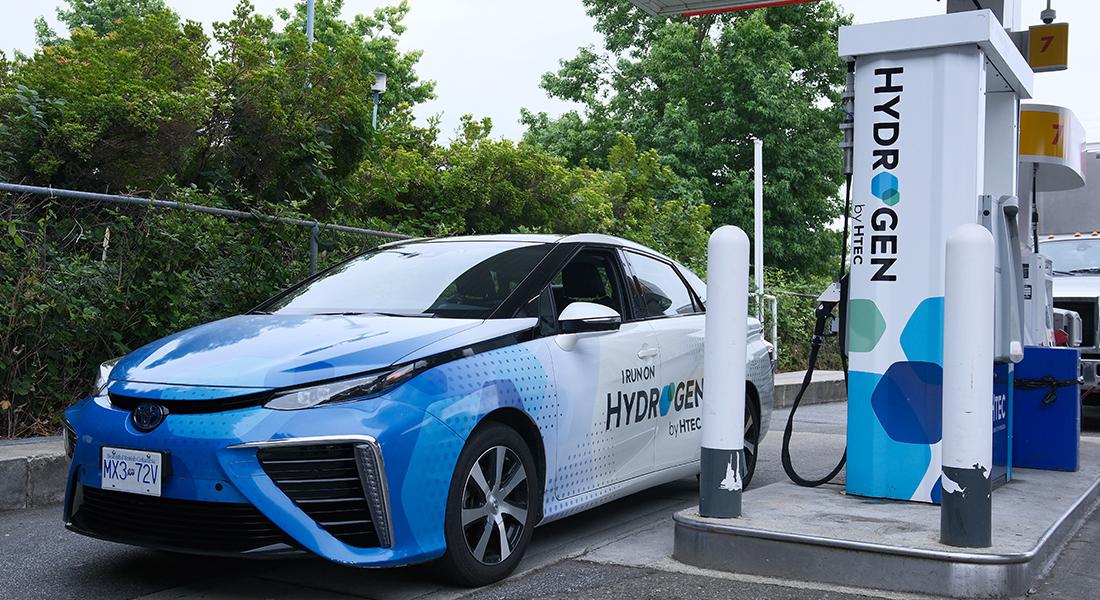Hydrogen on the rise in B.C.’s climate action plans

This blog post is part of a series of recent BC Hydro features on the use of clean and renewable power to support B.C.’s move away from fossil fuels in the fight against climate change.
Sabina Russell was there in the late 1990s when hydrogen fuel-cell technologies were all the rage in the war against air pollution. She was there as battery electric vehicles were embraced globally, and hydrogen was pushed to the sidelines.
And she’s here today as hydrogen receives a green light and funding from governments as a vital component in the fight against climate change. She’s the VP of Clean Fuels for HTEC, which is leading the charge with their H2 Gateway program that will deliver as many as 20 hydrogen refuelling stations along with hydrogen production facilities in B.C.
“It’s not just electrons, or just hydrogen, that will be needed for emissions reduction in transportation – we are going to need both in the future,” says Russell. “We know there’s been this historical debate about direct electrification versus hydrogen, but we strongly feel that both have a super important role.”
Almost 70% of B.C.’s end-use energy demand is currently met through fossil fuels such as gasoline, diesel and natural gas. Electrification and green or lower-carbon intensity hydrogen are seen as ways to switch from fossil fuels to help individuals and businesses transition to clean energy sources. Canada’s energy regulator, for example, forecasts that hydrogen could account for about 7.5% of B.C.’s energy demand by 2050 under their Canada Net Zero scenario.
BC Hydro’s subsidiary Powertech Labs has used a small electrolyzer to produce clean hydrogen in B.C. for years, and has supplied HTEC with the majority of the hydrogen for its five fuelling stations in the province. A technical innovator in hydrogen equipment, codes, and standards, Powertech Labs is a key player in B.C., which is home to more than 50% of all hydrogen and fuel cell companies in Canada.
Fuel cell electric vehicles running on hydrogen produce no tailpipe emissions, just water and warm air. Hydrogen is seen as one of the only solutions for decarbonizing sectors of the economy, such as with heavy-duty transportation.
Government and BC Hydro support shift to hydrogen
While the battery electric option remains the go-to globally for passenger and other light duty vehicles, the Government of BC has recognized that hydrogen will play a large role in the drive to B.C.’s 2050 goal of net zero emissions, especially in medium duty and long-haul trucking. Through B.C.’s Low Carbon Fuel Standard (LCFS), the government is supporting HTEC’s estimated $900 million H2 Gateway project with LCFS agreements of up to $133 million.
The Canada Infrastructure Bank (CIB) – a federal Crown Corporation – has also announced a $337-million loan to help HTEC proceed with the likes of fuelling stations, green hydrogen production in Burnaby, and by-product hydrogen production in North Vancouver.
Included in the H2 Gateway project is an initiative to deploy an initial fleet of 100 heavy-duty trucks, to be managed and leased through HTEC, that will focus on Class 7 and 8 hydrogen-fuelled trucks, including both hydrogen fuel cell and hydrogen internal combustion engine models.
Grey, blue, and green: the move to clean hydrogen
All hydrogen is a colourless gas, but not all is created equal. Most hydrogen currently produced in the world is known as grey hydrogen, which produces a lot of CO2 emissions via a chemical reaction between steam and methane. When carbon capture and storage is used to remove up to 95% of by-product CO2, the product is known as blue hydrogen.
But it’s green hydrogen that’s being embraced as the key in reducing GHG emissions. It’s produced through renewable sources such as BC Hydro’s electricity, which powers electrolysis that splits water into hydrogen and oxygen to produce green hydrogen.
The BC Government is far from alone in backing hydrogen. South of the border, the Biden administration is investing $7 billion in clean hydrogen with seven hydrogen hub projects across the nation. And in June, Hyundai Motor Co. chief executive Chang Jaehoon was appointed co-chair of the international Hydrogen Council. Based in Brussels, Belgium, the council is comprised of CEOs from 140 companies around the world and has formed a 2 billion-Euro fund to invest in hydrogen projects.
If you're a clean or high-tech large commercial or large industrial business looking to connect to clean energy, we're here to help. Our dedicated business and economic development team can provide expert advice, help match your business with an industrial site, and facilitate the connection process. Learn more about energy efficiency programs or contact us directly.